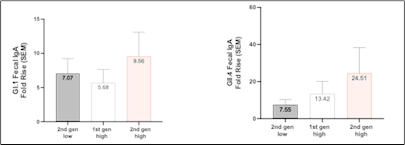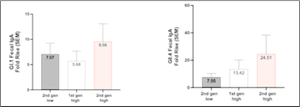Vaxart Reports Additional Phase 1 Data Supporting the Potential Efficacy of its Second-Generation Norovirus Oral Pill Vaccine Candidate
- Second-generation constructs induce robust increases in fecal IgA, which was shown to be correlated with protection against infection in the company’s previous Phase 2b challenge study -
SOUTH SAN FRANCISCO, Calif., Sept. 10, 2025 (GLOBE NEWSWIRE) -- Vaxart, Inc. (OTCQX: VXRT), a clinical-stage biotechnology company developing a range of oral recombinant pill vaccines based on its proprietary delivery platform, today reported additional positive data from the Phase 1 clinical trial evaluating its second-generation oral pill norovirus vaccine constructs head-to-head against its first-generation constructs. Dr. Sean Tucker, Vaxart’s Founder and Chief Scientific Officer, presented the data at the 9th International Calicivirus Conference, which is taking place in Banff, Canada, September 7-11, 2025. Further, Dr. Becca Flitter presented data on Vaxart’s norovirus challenge study at the same conference.
The data show a 25-fold increase in the GII.4 fecal IgA response and a 10-fold increase in the GI.I fecal IgA response over baseline with the high dose of the second-generation vaccine candidates after a single tablet administration for each strain. The data also show an 8-fold increase in the GII.4 fecal IgA response and a 7-fold increase in the GI.I fecal IgA response over baseline with the low dose of the second-generation vaccine candidates after a single tablet administration for each strain.
While the Phase 1 study was not powered to determine superiority by statistical methods, the fecal IgA increases observed with the second-generation constructs compared favorably to the increases observed with the first-generation constructs at the same high dose level and in the same study (13-fold GII.4 and 6-fold GI.1 over baseline). As previously reported, a Phase 2 challenge study of the first-generation constructs identified fecal IgA as a critical correlate to protection from norovirus infection.1
“With these positive fecal IgA results and the previously announced serum responses, the totality of data has given us confidence that our second-generation constructs induce more robust immunologic responses than our first-generation constructs. These immunological endpoints are important because they correlated with protection in our Phase 2b challenge study,” said Dr. Tucker. “As the first-generation constructs demonstrated a statistically significant 30% relative reduction in infection compared with placebo, we believe the numerically greater fecal IgA and functional blocking antibody responses observed in the Phase 1 head-to-head study have the potential to translate into improved efficacy.”
These new data confirm that Vaxart’s vaccine technology, which induces intestinal immunity, likely enables stronger protection against infection from norovirus by providing better immunity at the site of virus entry. With second-generation constructs that produces more intestinal IgA, these data further differentiate Vaxart’s norovirus vaccine approach from others in development, which are more focused on generating a serum antibody response.
In June 2025, Vaxart reported data from the Phase 1 head-to-head study demonstrating that its second-generation norovirus constructs produced statistically significant increases in GI.1 and GII.4 norovirus blocking antibodies (141% and 94%, respectively) compared with first-generation constructs. Norovirus blocking antibodies also correlated with protection against infection in the Phase 2b challenge study.
“Results to date on all our norovirus vaccines studies give us confidence that we may have a potential solution for an easily transmitted disease with a $10+ billion economic impact in the U.S.,” said Steven Lo, Chief Executive Officer of Vaxart. “We believe these new data further support our efforts to secure a partnership or other funding to conduct a Phase 2 trial of these constructs.”
Assuming a partnership or other funding, Vaxart plans to conduct a Phase 2b safety and immunogenicity study that could potentially begin before the end of 2025 followed by an End of Phase 2 meeting with the U.S. Food and Drug Administration (FDA). A Phase 3 trial could then begin as early as 2026.
There is no approved vaccine against norovirus, a leading cause of acute gastroenteritis (AGE) worldwide that is responsible for outbreaks of infection and illness globally. Each year there are approximately 685 million norovirus infections globally, with 20 million infections occurring annually in the United States. Due to these high rates of infection, norovirus is believed to cause nearly 20% of diarrheal disease globally. Additionally, the economic burden associated with norovirus infection and AGE is estimated at $60 billion worldwide and $10 billion in the United States.

Fecal IgA response data from Vaxart’s Phase 1 norovirus study
Reference
1 Flitter BA, Gillard J, Greco SN et al. An oral norovirus vaccine generates mucosal immunity and reduces viral shedding in a phase 2 placebo-controlled challenge study. 2025;17(798):eadh9906.
About Vaxart
Vaxart is a clinical-stage biotechnology company developing a range of oral recombinant vaccines based on its proprietary delivery platform. Vaxart vaccines are designed to be administered using pills that can be stored and shipped without refrigeration and eliminate the risk of needle-stick injury. Vaxart believes that its proprietary pill vaccine delivery platform is suitable to deliver recombinant vaccines, positioning the company to develop oral versions of currently marketed vaccines and to design recombinant vaccines for new indications. Vaxart’s development programs currently include pill vaccines designed to protect against coronavirus, norovirus and influenza, as well as a therapeutic vaccine for human papillomavirus (HPV), Vaxart’s first immune-oncology indication. Vaxart has filed broad domestic and international patent applications covering its proprietary technology and creations for oral vaccination using adenovirus and TLR3 agonists.
Note Regarding Forward-Looking Statements
This press release contains forward-looking statements that involve substantial risks and uncertainties. All statements, other than statements of historical facts, included in this press release regarding Vaxart's strategy, prospects, plans and objectives, funding milestones, the results of the FDA’s review of any trials, studies, or data, results from clinical trials and the timing of such results and such trials, commercialization agreements and licenses, and beliefs and expectations of management are forward-looking statements. These forward-looking statements may be accompanied by such words as “should,” “believe,” “could,” “potential,” “will,” “expected,” “anticipate,” “plan,” and other words and terms of similar meaning. Examples of such statements include, but are not limited to, statements relating to Vaxart’s ability to complete the Phase 1 trial of its oral bivalent norovirus vaccine; Vaxart's ability to develop and commercialize its product candidates, including its vaccine booster products; Vaxart's expectations regarding clinical results and trial data, including their design, and the timing of such trials and of receiving and reporting such clinical results and trial data; Vaxart’s expectations regarding timing of enrollment in studies; and Vaxart's expectations with respect to the effectiveness of its product candidates and the potential of its vaccine pill platform. Vaxart may not actually achieve the plans, carry out the intentions, or meet the expectations or projections disclosed in the forward-looking statements, and you should not place undue reliance on these forward-looking statements. Actual results or events could differ materially from the plans, intentions, expectations, and projections disclosed in the forward-looking statements. Various important factors could cause actual results or events to differ materially from the forward-looking statements that Vaxart makes, including uncertainties inherent in research and development, including the ability to meet anticipated clinical endpoints, commencement, and/or completion dates for clinical trials, regulatory submission dates, regulatory approval dates, and/or launch dates, as well as the possibility of unfavorable new clinical data and further analyses of existing clinical data; the risk that clinical trial data are subject to differing interpretations and assessments by regulatory authorities; whether regulatory authorities will be satisfied with the design of and results from the clinical studies; decisions by regulatory authorities impacting labeling, manufacturing processes, and safety that could affect the availability or commercial potential of any product candidate, including the possibility that Vaxart's product candidates may not be approved by the FDA or non-U.S. regulatory authorities; that, even if approved by the FDA or non-U.S. regulatory authorities, Vaxart's product candidates may not achieve broad market acceptance; that a Vaxart collaborator may not attain development and commercial milestones; that Vaxart or its partners may experience manufacturing issues and delays due to events within, or outside of, Vaxart's or its partners' control; difficulties in production, particularly in scaling up initial production, including difficulties with production costs and yields, quality control, including stability of the product candidate and quality assurance testing, shortages of qualified personnel or key raw materials, and compliance with strictly enforced federal, state, and foreign regulations; that Vaxart may not be able to obtain, maintain, and enforce necessary patent and other intellectual property protection; that Vaxart's capital resources may be inadequate; Vaxart's ability to resolve pending legal matters; Vaxart's ability to obtain sufficient capital to fund its operations on terms acceptable to Vaxart, if at all; the impact of government healthcare proposals and policies; competitive factors; and other risks described in the "Risk Factors" sections of Vaxart's Quarterly and Annual Reports filed with the U.S. Securities and Exchange Commission. Vaxart does not assume any obligation to update any forward-looking statements, except as required by law.
Contact
Vaxart Media and Investor Relations:
Matt Steinberg
FINN Partners
IR@vaxart.com
(646) 871-8481
A photo accompanying this announcement is available at https://www.globenewswire.com/NewsRoom/AttachmentNg/4f602ca4-a4cd-4333-9869-f7a62c03130b
This press release was published by a CLEAR® Verified individual.

Legal Disclaimer:
EIN Presswire provides this news content "as is" without warranty of any kind. We do not accept any responsibility or liability for the accuracy, content, images, videos, licenses, completeness, legality, or reliability of the information contained in this article. If you have any complaints or copyright issues related to this article, kindly contact the author above.

